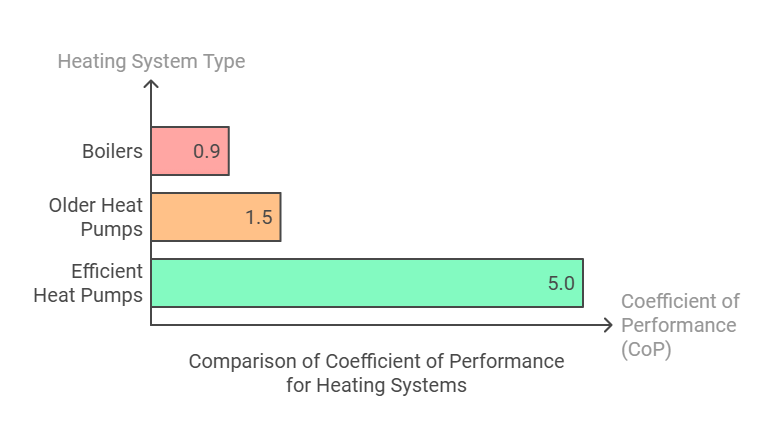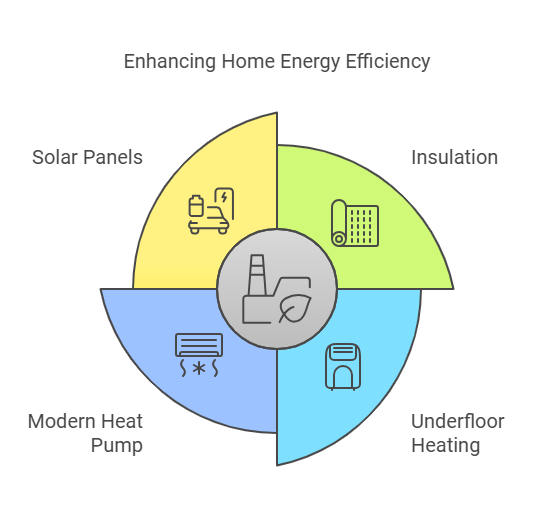Do Heat Pumps Use A Lot Of Electricity?

Installing a heat pump is your gateway to a greener lifestyle and long-term energy savings. While gas boilers are still the most common heating option in the UK, government initiatives and a sense of responsibility towards the planet are causing many people to transition away from fossil fuels.
Heat pumps use renewable energy, making them a wise investment for the future. The main concern people have when considering heat pump installation is whether their heat pump will use a lot of electricity.
While heat pumps do need electricity to run, the annual costs depend on multiple factors. We’ll explore them in this post.
How much electricity does the average heat pump use?
The amount of electricity consumption per heat pump depends on numerous factors, including the pump’s size and your property’s insulation.
The average UK household requires around 12,000 kWh of heating annually, which means that both heat pumps and boilers will need to deliver this amount of heat.
Heat pumps stand out because of their efficiency. We measure heating system efficiency by the Coefficient of Performance (CoP), which defines the output of heat per unit of electricity (input).
While boilers have an average CoP of 0.9, heat pumps range between 1.5 (older models) to 5.0 (the most efficient models), which means they generate four times more heat per unit of electricity—making pumps more sustainable than gas boilers.

Average annual running costs of heat pumps and gas boilers
It’s difficult to calculate the exact running costs of a heat pump because they depend on the system you use and its CoP rating. For example, a modern heat pump with a 4.0 rating will cost less to run than one with a 3.0 rating.
It’s also vital to remember that electricity does cost more than gas, but the boiler’s efficiency rating makes a massive difference to the running costs.
Heating System Average Annual Running Costs
| Air-Source Heat Pumps | £730 to £1380 |
| Ground-Source Heat Pumps | £740 to £905 |
| G-rated Gas Boilers | £765 to £1545 |
| A-rated Gas Boilers | £610 to £1240 |
As you can see, an A-rated gas boiler is slightly cheaper than a heat pump system, but there are things that impact your electricity usage and taking steps to improve efficiency could significantly reduce the annual running costs of heat pump systems.
Which factors impact heat pump electricity consumption?
Heat pumps are a long-term investment, and knowing how to integrate them into your home effectively means you can look forward to higher savings. The following factors define the pump’s electricity consumption.
Refrigerant
The refrigerant in modern heat pump systems plays a key role in facilitating heat transfer from the natural source into your property. Most systems use refrigerants with a low GWP (Global Warming Potential) to enhance efficiency, but older models are less environmentally friendly.
A heat pump with less efficient refrigerant will struggle to absorb and release heat more than low GWP refrigerant, resulting in more electricity usage.
Climate
Heat pumps need to work harder in colder climates, but that doesn’t mean they’re not energy efficient. In fact, heat pump technology has advanced, and today’s systems—even air-source heat pumps—can operate in below-freezing temperatures.
If you have an older system, it will need to work overtime, impacting annual electricity costs.
Heat pump type
Air-source and ground-source heat pumps are the most popular options, as they’re more accessible than water-source heat pumps. However, the type you choose can influence running costs.
Most households install a highly efficient air-source heat pump that can deliver year-round heating and cooling. A ground-source heat pump costs more to install, and you’ll need enough outdoor space – but their annual electricity consumption is usually lower.
Insulation
Never underestimate the importance of insulation. Seriously, it can save hundreds each year. If your home can’t retain heat, the pump must work harder to effectively warm the room, increasing electricity usage.
If you use cooling mode in the summer and your property lacks insulation, it will increase your costs as the rooms won’t be able to maintain consistent temperatures.
System Size
Understanding your home’s estimated heat demand is vital when choosing a heat pump. If you pick a model that’s too small, it will work overtime to heat your home. In contrast, if you choose a large system, you’ll use electricity that you don’t need.
Working with home heat pump installers can be beneficial, as professional technicians can help you choose the appropriate size for your property’s needs.
Top tips for reducing your energy bills:

- Insulate Your Home: Make sure your home is properly insulated before installing a heat pump. You’ll use less electricity each year by sealing gaps and ensuring each room retains warmth.
- Underfloor Heating: Installing an underfloor heating system can be beneficial, as it operates at a lower water heating temperature than a traditional radiator. The heat pump won’t need to work as hard, so it will reduce your energy bills.
- Choose A Modern Pump: While choosing an older heat pump might seem like a good idea, your energy costs will mount up over time. Heat pump efficiency is directly influenced by age, and modern systems are more affordable to run in the long term.
- Install Solar Panels: The best way to achieve maximum annual electricity savings is to install solar panels. They rely on solar power to operate and can significantly reduce your carbon footprint. Solar panels can power the heat pump, decreasing your reliability on grid electricity.
Final thoughts
As you can see, multiple factors impact the annual costs of heat pumps, but it’s important to remember that their high energy efficiency can save money. We also need to consider the fact that many central heating users can save money due to fixed tariffs.
As more households and businesses choose heat pumps instead of fossil fuels, electricity companies are likely to offer competitive tariffs that cut annual running costs.
If you want to reduce your carbon footprint and transition to renewable energy, Hometree specialises in affordable heat pump installations and solar panel installations. Please contact us today for more information.
Thinking of getting a heat pump?
We Beat or Match Any Quote
Call 0330 912 4843 and we’ll beat or match any quote.
Serious About Service
24/7 claims support & rated Excellent on Trustpilot
Cover Match Guarantee
Get a £50 gift card if you find something we don’t cover
All Gas Boilers Covered
All makes and models, regardless of age


